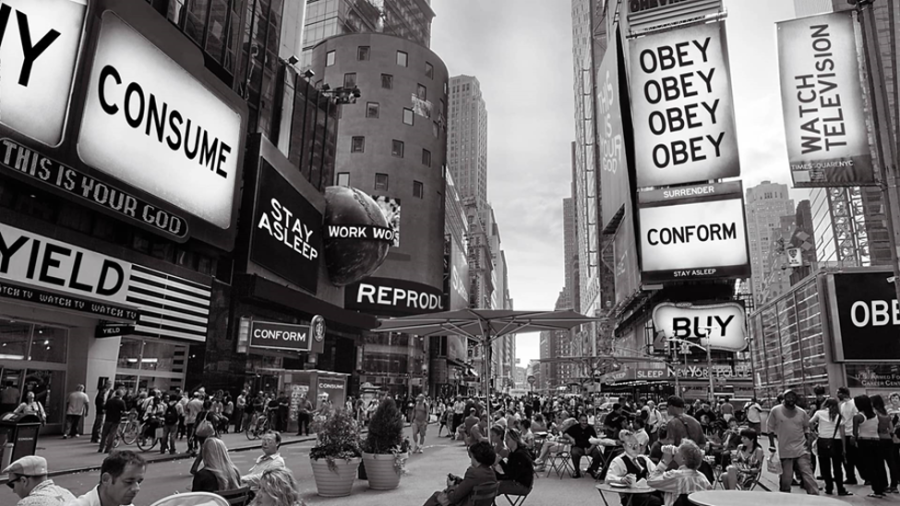The Culture Industry was a phrase coined by Theodor Adorno and Max Horkheimer in their 1947 book Dialectic of Enlightenment. They were somewhat ahead of their time in this theory, as it is more relevant today than ever before, with the advancements of technology and the world we live in. The Culture Industry essentially refers to culture’s mass production and consumption and is a negative criticism of capitalism. It suggests that we, as consumers, are ÔÇśtoldÔÇÖ what we need to buy by the media. Some key characteristics of the Culture Industry are standardisation, pseudo-individualism and mass deception.┬á
Adorno and Horkheimer are both prominent critical theorists and key figures when considering the Culture Industry. Adorno studied philosophy, sociology, psychology and music and was mainly focused on the intersection of culture, society and psychology. Horkheimer studied philosophy and psychology and went on to become an influential sociologist in critical theory. Both were highly influenced by Marx, as can be surmised from their harsh criticisms of capitalism. One of AdornoÔÇÖs most popular quotes, ÔÇťThe culture industry not so much adapts to the reactions of its customers as it counterfeits themÔÇŁ, further highlights his criticisms of capitalism. This shows how these two thinkers were sceptical of the media industries and were warning the public about the dangers of overconsumption and capitalism.┬á┬á
There is, of course, a danger to this theory, which is that the cultivation of false needs can only be satisfied by capitalism. Only then will we, as consumers, feel fulfilled. However, it is an endless cycle of seeing things, wanting them, and buying them. This suggests that the media is tricking the consumers into telling them what they need to buy. It has created a world of mass consumption and false needs which Adorno and Horkenheimer argue can only be fulfilled by capitalism, therefore enhancing the system, and it is a cycle of desire and purchase. 
Living and working in the 20th century, Adorno and Horkheimer cited media such as radio, cinema and popular music as examples of the culture industry. Today, we see these examples as fast fashion, social media and beauty standards. Fast fashion produces standardised clothing trends that are quickly produced and marketed, promoting constant consumer turnover. These garments are usually of poor quality, as they are only likely to be worn during the trend cycle, and before you know it, they are being thrown away or donated. In the past couple of decades, we have seen technology advance at a rapid pace, and social media is no stranger to this. The algorithms on social media shape what we see and reinforce existing beliefs, further promoting consumerism. We are constantly targeted with specific adverts that the algorithm knows we will be interested in. Technology is constantly learning to adapt to its users, further boosting the Culture Industry.
References
Adorno, T.W., 1944. The culture industry: Enlightenment as mass deception. Available at: https://www.marxists.org/reference/archive/adorno/1944/culture-industry.htm [Accessed 18 Oct. 2024]
Berger, A.A., 2018. The culture of capitalism. In: Media, Ideology and Hegemony. Brill, pp. 59ÔÇô67. Available at: https://brill.com/display/book/9789004364417/BP000004.xml [Accessed 19 Oct. 2024].
Horizon Hub, 2021. Consumer culture: The impact of fast fashion. Medium. Available at: https://medium.com/horizon-hub/consumer-culture-the-impact-of-fast-fashion-a3285b110551 [Accessed 19 Oct. 2024].
Scannell, P., 2007. Media and communication. Thousand Oaks, California: SAGE Publications, p. 37.


This was very educational to read. The link of fast fashion with culture industry is interesting! What you said is so incredibly true, we have seen an increase in fast fashion due to the increase in demand of items, most likely caused by social media and what people are seeing. The algorithm and curated feeds are leading people to believe that certain things are trending, when in reality theyÔÇÖre notÔÇŽ like you mentioned. I canÔÇÖt help but think about how bad this will be for the future of the environment as most of these items end up in landfills. I would also say that the rise of influencers has played a huge role in over consumption, as their entire job is to promote and sell.
Adorno and Horkheiner were in fact ahead of their time, and to see that their theory still holds up today is great.